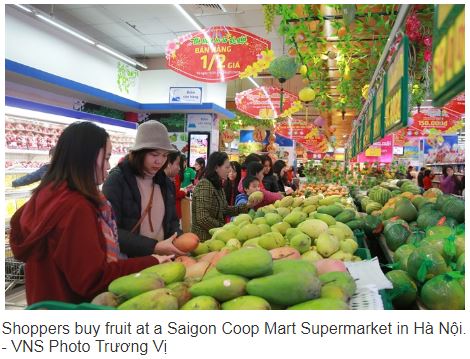Vietnam: CPI targeted at 3.3-3.9% this year: Deputy PM
HANOI — Ministries, sectors and localities was asked to control the consumer price index (CPI) in the range of 3.3 to 3.9 per cent this year.
Deputy Prime Minister Vuong Dinh Hue, head of the National Steering Committee on Price Management, set the goal at the committee’s meeting on reviewing performance last year and planning tasks for this year held in Hanoi on January 17.
This target, that meet the requirements of the Government’s Resolution 01/NQ-CP dated January 1, 2019 on controlling CPI at below 4 per cent, was set after the Department of Price Management under the Ministry of Finance, the General Statistics Office (GSO) under the Ministry of Planning and Investment and the State Bank of Vietnam proposed price management scenarios for this year at the meeting.
Hue said this scenario has been calculated on the basis of adjusting the prices of petroleum products, pork, and continuing to bring the salary structure and a part of management costs into health services and electricity prices.
They were asked to continue managing basic inflation in the range of 1.6 to 1.8 per cent, said Hue, adding that the Ministry of Finance and GSO have to supplement and adjust the price management scenarios according to the above target.
“In the first quarter of 2019, they must ensure supply to avoid a ‘fever’ on goods and price increases and focus on bringing goods to remote areas and cities with many workers. That will ensure the lowest inflation growth rate in February, 2019,” Hue said.
Deputy Minister of Industry and Trade Do Thang Hai said the industry and trade sector has organised production and distribution of goods for the Lunar New Year to remote areas and big cities with many workers to avoid such a fever.
For adjustments to electricity prices this year, the Deputy Prime Minister required inputs to be transparent and kept under control, as well as adjusting electricity prices synchronously with gas prices for consumption and coal prices for electricity production.
The adjustment of electricity prices must aim at attracting energy investors and reducing costs for production and consumption, he said. The power sector should strengthen technology and restructuring of production and labour to continue cutting production costs.
Meanwhile, the Ministry of Industry and Trade has built a scenario to manage petrol prices for the year on the basis of closely following global petrol and oil prices. The ministry has a plan on using the petrol price stabilisation fund and adopting policies to encourage use of bio fuel.
The Ministry of Health was asked to calculate salaries and management into the cost of examination and treatment services. It must coordinate with the Vietnam Social Insurance Agency to continue expanding the list of drugs and medical equipment and materials under auction and negotiate to reduce the price of medicines.
At the meeting, the Steering Committee reported that in 2018, price management and inflation control were successful with CPI growth at 3.54 per cent, much lower than the target of about 4 per cent.
This is the third consecutive year with inflation controlled at below 4 per cent, making an important contribution to the success of socio-economic development and building trust with people and businesses.
This success was due to the ministries and sectors managing prices according to market principles and global price fluctuations. They had operating scenarios for each month and each quarter from the beginning of the year based on scientific calculations. — VNS
Source: http://vietnamnews.vn/economy/484028/cpi-targeted-at-33-39-this-year-deputy-pm.html#YSbtuLUS1ESvLrfp.99


 Thailand
Thailand




